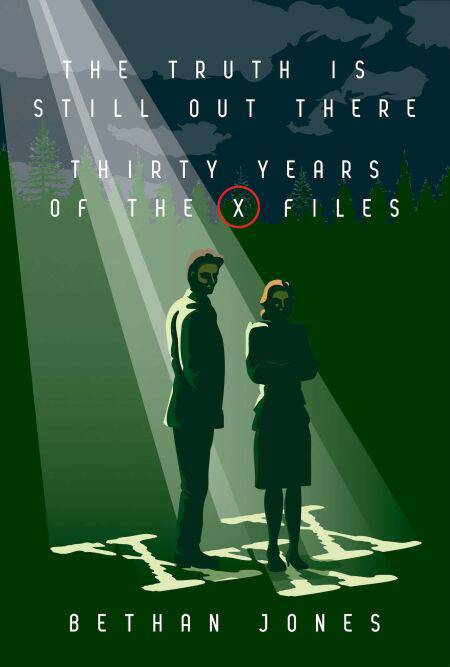
Je cadeautjes zeker op tijd in huis hebben voor de feestdagen? Kom langs in onze winkels en vind het perfecte geschenk!
- Afhalen na 1 uur in een winkel met voorraad
- Gratis thuislevering in België vanaf € 30
- Ruim aanbod met 7 miljoen producten
Je cadeautjes zeker op tijd in huis hebben voor de feestdagen? Kom langs in onze winkels en vind het perfecte geschenk!
- Afhalen na 1 uur in een winkel met voorraad
- Gratis thuislevering in België vanaf € 30
- Ruim aanbod met 7 miljoen producten
Zoeken
€ 11,17
+ 11 punten
Uitvoering
Omschrijving
X-Phile/scholar Bethan Jones reassesses the cultural significance of the phenomenally successful TV series The X-Files, paying special attention to the evolving nature of conspiracy theories and disinformation campaigns over the thirty years since the show's premiere.
In September 1993, a TV show like no other appeared on our screens, asking us to consider the essence of truth and belief, to think about the nature and roles of science and humanity, and to question what we were told by those in power. Combining horror, science fiction, drama, crime, and comedy with cinematic filmmaking, The X-Files transported the paranoia of the sixties and seventies to the technologically savvy nineties as it followed two iconic characters, FBI Agents Fox Mulder and Dana Scully, in their labyrinthine pursuit of truth. Further, The X-Files reversed conventional television gender roles: Mulder was our believer in the paranormal, chasing down clues in search of his abducted sister; Scully was the skeptic, a scientist preaching rationality and objective truth.
Now, thirty years later, the nature of conspiracy theories may have changed, but the anxiety surrounding them has not. In an era in which Watergate has been replaced by Gamergate and conspiracy theorists blindly embrace the myth of a stolen election and maintain that an all-powerful cabal of Satanic Democrats—defeatable by only one man—is preying on children, The X-Files remains as relevant as ever, if not more so. Conspiracy theorists are no longer on the fringes of society; they sit in halls of fame, in corridors of schools and universities, and at the heart of government, and The X-Files reflects these apprehensions back at us.
Part love letter, part history, part analysis, The Truth Is Still Out There: Thirty Years of The X-Files examines the social, cultural, and technological impact of the show. Using big ideas from philosophy, sociology, and cultural studies and topical issues such as #MeToo, QAnon, and artificial intelligence, the book highlights how and why The X-Files became a global phenomenon. Drawing on both her own fandom and her academic research, Bethan Jones analyzes the original nine seasons as well as the two feature films and the revival series to explore how the show helps us think about the most provocative questions of our time.
In September 1993, a TV show like no other appeared on our screens, asking us to consider the essence of truth and belief, to think about the nature and roles of science and humanity, and to question what we were told by those in power. Combining horror, science fiction, drama, crime, and comedy with cinematic filmmaking, The X-Files transported the paranoia of the sixties and seventies to the technologically savvy nineties as it followed two iconic characters, FBI Agents Fox Mulder and Dana Scully, in their labyrinthine pursuit of truth. Further, The X-Files reversed conventional television gender roles: Mulder was our believer in the paranormal, chasing down clues in search of his abducted sister; Scully was the skeptic, a scientist preaching rationality and objective truth.
Now, thirty years later, the nature of conspiracy theories may have changed, but the anxiety surrounding them has not. In an era in which Watergate has been replaced by Gamergate and conspiracy theorists blindly embrace the myth of a stolen election and maintain that an all-powerful cabal of Satanic Democrats—defeatable by only one man—is preying on children, The X-Files remains as relevant as ever, if not more so. Conspiracy theorists are no longer on the fringes of society; they sit in halls of fame, in corridors of schools and universities, and at the heart of government, and The X-Files reflects these apprehensions back at us.
Part love letter, part history, part analysis, The Truth Is Still Out There: Thirty Years of The X-Files examines the social, cultural, and technological impact of the show. Using big ideas from philosophy, sociology, and cultural studies and topical issues such as #MeToo, QAnon, and artificial intelligence, the book highlights how and why The X-Files became a global phenomenon. Drawing on both her own fandom and her academic research, Bethan Jones analyzes the original nine seasons as well as the two feature films and the revival series to explore how the show helps us think about the most provocative questions of our time.
Specificaties
Betrokkenen
- Auteur(s):
- Uitgeverij:
Inhoud
- Aantal bladzijden:
- 148
- Taal:
- Engels
Eigenschappen
- Productcode (EAN):
- 9781949024517
- Verschijningsdatum:
- 3/08/2023
- Uitvoering:
- E-book
- Beveiligd met:
- Adobe DRM
- Formaat:
- ePub

Alleen bij Standaard Boekhandel
+ 11 punten op je klantenkaart van Standaard Boekhandel
Beoordelingen
We publiceren alleen reviews die voldoen aan de voorwaarden voor reviews. Bekijk onze voorwaarden voor reviews.









